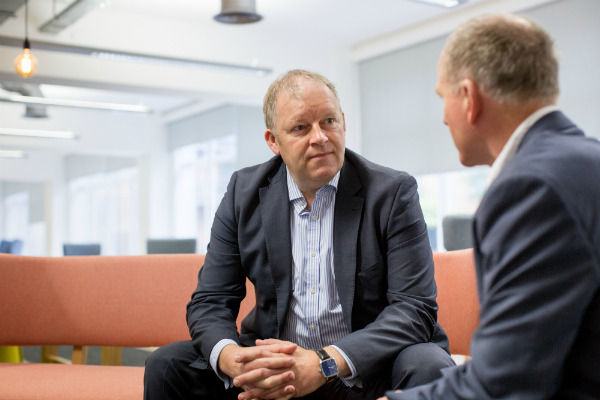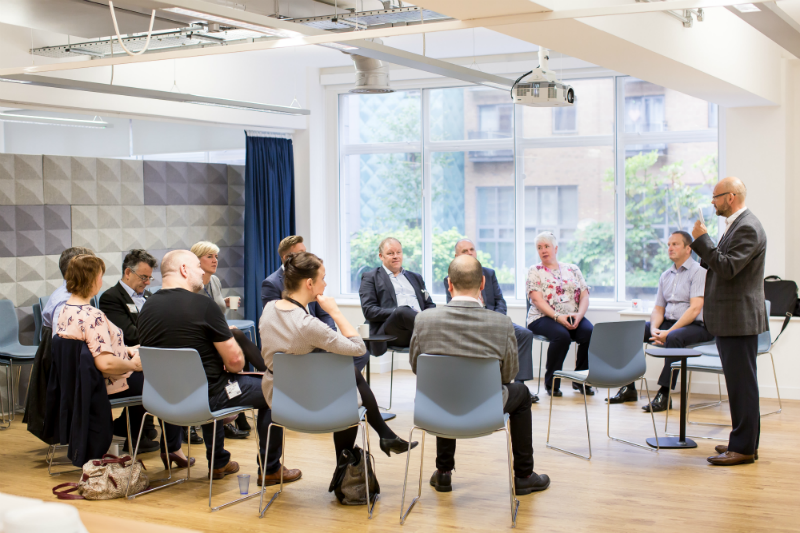National Mentoring Day: changing trends in mentoring
25 October 2017
The explosion in mentoring in the last few years has led to an evolution in mentoring methods, while remaining true to its original spirit, according to Andy Hall, mentoring advisor, Business Growth Hub.
Mentoring is commonly described as ‘a voluntary one-to-one relationship between two individuals, where one (the mentor) shares their relevant experience with another (the mentee) for mutual benefit and development’.
Over the past few years, there has been a huge rise in the use of the word mentoring, and an increase in mentoring programmes. I’ve observed the results of many excellent mentoring partnerships, both from the Hub's mentoring programme and programmes at other organisations.
Mentoring framework
Those who haven't mentored before often prefer to use a structured framework initially - it helps set expectations, and to schedule quality mentoring time. However, as a mentor becomes more experienced, they may prefer a more flexible approach.
Internal vs external
Internal mentoring (within an organisation) tends to employ a more rigid structure, often including objectives relating to career progression and skill development. It’s easier to find a mentor with relevant experience if looking internally. The relationship is often more visible and can be “seen” to be beneficial to those more senior roles. Confidentiality can be an issue, as mentees may tend to hold back for fear of colleagues hearing about the outcomes.
External mentoring can be more holistic, coving more mentee-led topics. As those in business will testify, mentees encounter challenges increasingly frequently and need swift support to meet the demands of their business. This “on-demand” culture is lending itself to a more flexible format: for example, instant access to mentors via digital channels is changing the type of interactions between mentor and mentee.

Mentoring in the digital age
You’d have to be living on another planet to miss how the internet has changed almost every aspect of our lives. From email to social media there is an endless supply of communication channels that mentors and mentees could use. This is great for mentees who may not want to wait for their next mentoring meeting to share an update or, more importantly, ask for advice. Consequently, I have seen the frequency of interactions increase sharply. Only a few years ago business mentoring was almost completely offline and face-to-face, with the occasional scheduled telephone call. Now, I see a typical relationship begin with a brief phone or Skype call to understand if both parties can “work” together, followed by a rapport-building face-to-face meeting at a hotel or coffee shop. Only then will the partnership start to develop via scheduled coffees, ad hoc texts, instant messages, direct messages on social media.
Frequency shift
Being available 24/7 sees mentors and mentees tweeting and sending direct messages throughout the month. Those who know me will see that I tweet my mentees (and other mentors) both privately and publically, helping to share information. Several times a week I exchange messages with mentees. While some mentoring purists might consider this too informal, I see strong benefits for both parties. Where historically a typical partnering would have contact once every three to four weeks, modern mentoring’s increased interaction is evolving perceptions of mentoring from wise, kindly sage to something more akin to a friend at the end of a mobile device.
The downsides to looser, more frequent interaction are the formality of mentoring can diminish and certain essentials around the relationship can be overlooked, such as specific success measurements and boundaries around professionalism and confidentiality. Without structure and measurements, a relationship can drift into too casual a friendship, and both parties find it hard to “break-up” or end the formal programme they originally signed up for.
Group mentoring
The title suggests that a number of new mentees hear from one or a few experienced mentors. Of course, this can be great for hearing multiple points of view via a group forum or webinar. I do, however, challenge that this is not actually mentoring and a better description would be workshop or training course. I have been a cohort mentor which had many benefits and drawbacks. We would meet as a team and blend in one-to-one meetings to reinforce the learning and tailor experience to the individual. However, this is often “forced” mentoring and carries more counterproductive risks.

Reverse mentoring
This term is used more often now as an effect of the increasing digitisation of the world. Reverse mentoring can imply that a younger person is the mentor and the older mentee learns new skills, rather than experience. This can be misleading for two reasons: firstly, mentoring should be about a flexible mentee-led agenda, whereby the mentee learns from their mentor’s shared experiences; secondly, a mentor-mentee relationship shouldn’t be age-specific. Irrespective of age, if you have the more relevant experience you are, by default, the mentor. The waters are somewhat muddied by the style of mentoring that results. Effective mentoring is based on great questions from both parties to understand and challenge rather than a show-and-tell style which is often proven to be less successful for the leaner/mentee.
Semantics
It could be argued that the word mentoring is often overused. A mentor can be seen as anyone who knows more than the learner; a teacher, trainer, coach, consultant, advisor or maybe even a counsellor. All of these skills and roles are specific and incredibly important in their own right and shouldn’t be classed as mentoring.
However, the focus here should be on what is best for both parties, and the words here less important. Any form of motivated and committed learning and sharing is invaluable for all involved. Mentoring simply accelerates learning and decision making and will continue to be practised, as it has been for many years, for the foreseeable future, despite the words we use to describe it.
To find out more about our leadership and mentoring programme and even become part of it, Enquire and Grow today.